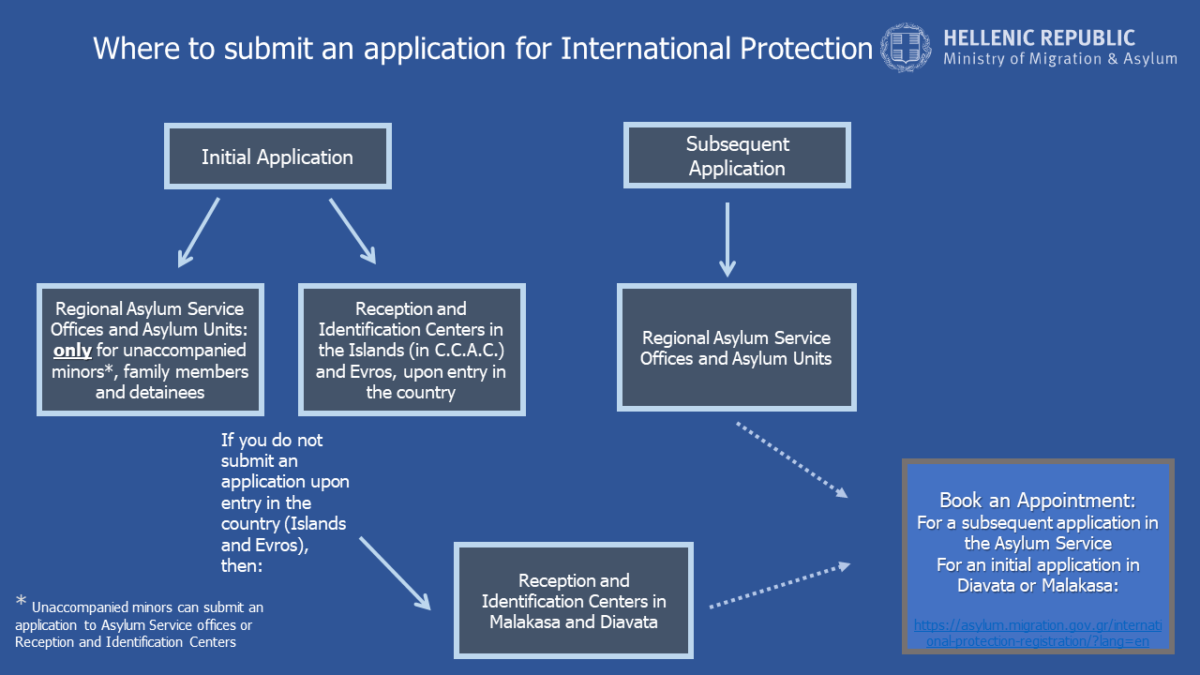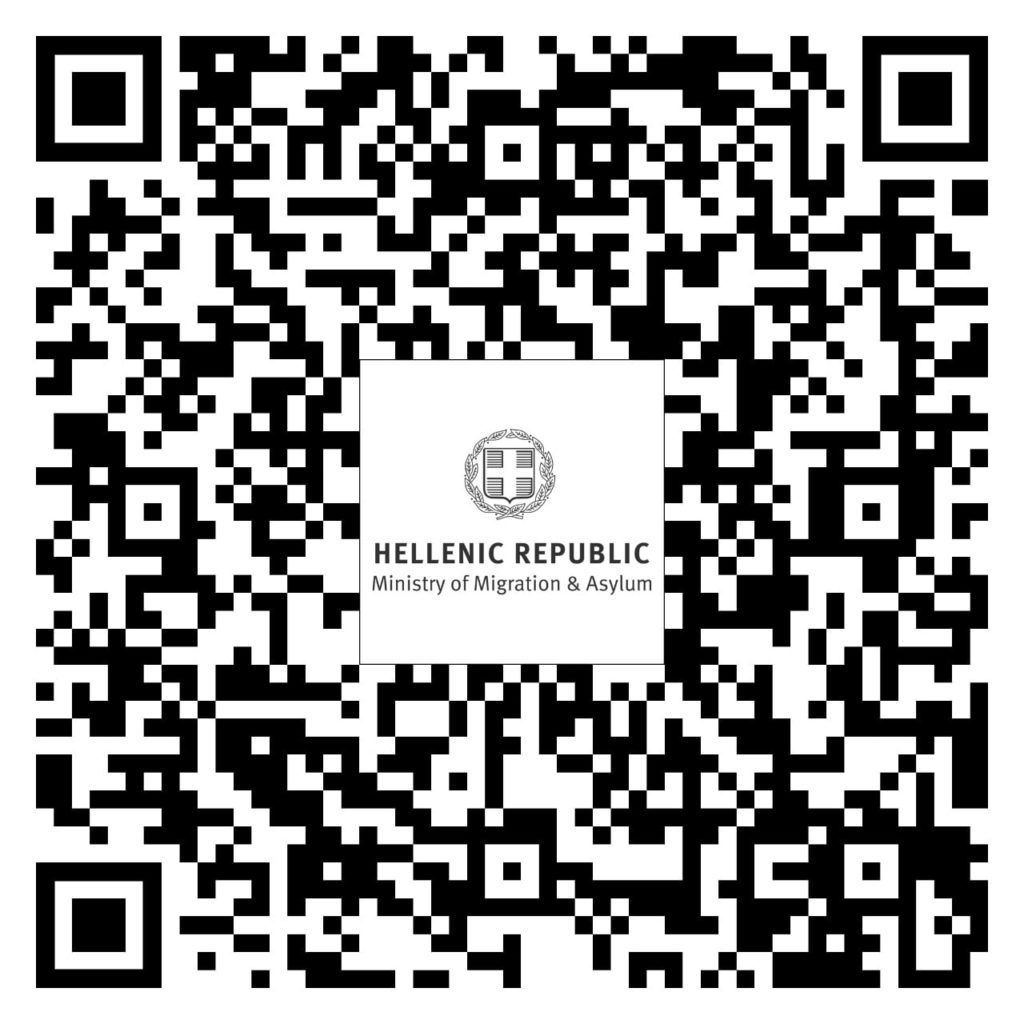The Application for Asylum (International Protection)
Every third country citizen or stateless person who is at the official country entry points or within the Greek territory has the right to apply for international protection (asylum). Access to the asylum procedure is open and free of charge.
Applicants for asylum or international protection are third-country nationals or stateless persons who lodge an application for international protection, whether initial or subsequent, with the competent authorities. The Greek authorities grant two forms of international protection: refugee status and subsidiary protection status.
Refugee status is granted to any person who has been forced to leave his or her country of origin or, in the case of a stateless person, his or her country of former habitual residence, and who cannot or does not wish to return to it for fear of persecution on account of his or her race, religion, nationality, political opinion or membership in a particular social group.
Subsidiary protection status is granted to any person who does not meet the above criteria for refugee status, but there are substantial grounds to believe that he or she runs a serious risk of suffering serious harm in his or her country of origin or former habitual residence, in particular because he or she would be in danger of facing the death penalty or execution, or of being subjected to torture or to inhuman or degrading treatment, or because his or her life or physical integrity would be threatened as a result of an international or internal armed conflict.
Third-country citizens or stateless persons who are transferred to Greece from a state that applies Regulation 604/2013 of the European Union (Dublin III) are also considered as applicants for international protection.
You can also apply for your family members if they are with you in Greece and wish to do so.
You may lodge your initial application before the competent authorities, which are the Reception and Identification Centres on the islands of Lesvos, Chios, Samos, Leros and Kos, as well as in Evros (Fylakio) for those entering from these points. If you do not lodge your application at the above points, you can alternatively apply at the Reception and Identification Centres in Malakasa and Diavata exclusively by e-appointment.
The competent authorities for receiving a subsequent application are the Regional Asylum Offices or the Asylum Units, only by appointment through the following online platform.
The Asylum Service shall only receive an application as a subsequent application if you have received a final decision on the asylum application you previously submitted to the Asylum Service or the Hellenic Police, or if you have resigned from your application.
The competent authorities for submitting applications for unaccompanied minors are the Regional Asylum Offices and the Asylum Units.
If you are a minor and you are in Greece unaccompanied, without your parents, please follow this link.
If you are a detainee or you stay in a Reception and Identification Centre (RIC), follow this link.
The Asylum Procedure (First Instance)
The application for international protection shall be lodged in person, by electronic registration.
To make an initial registration of an asylum application at the Reception and Identification Centres in Malakasa and Diavata, you can make an appointment through the following online platform.
To make a subsequent registration of an asylum application at the competent Regional Offices and Asylum Units you can make an appointment through the following online platform.
If you have entered Greece without the legal formalities, you will be transferred to a Reception and Identification Centre, and if you do not have a document from a public authority proving your citizenship and identity, you will go through reception and identification procedures.
You will be required to remain on the premises of the Reception and Identification Centre for the duration of the processing of your application, provided that this period does not exceed twenty-five (25) days.
In total, the processing of your application may take from twenty (20) days to six (6) months, depending on your case.
Registering the Application
The full registration of your application includes your identity details, your country of origin, the name of your father, mother, spouse and children, your e-mail address if available, biometric identification, a full statement of the reasons why you are seeking international protection, your address of residence or stay, the language in which you wish your application to be examined and, if you wish, the appointment of an authorized representative.
You may be subjected to a body search or search of your belongings. You may go through medical examinations.
When you lodge your application, an interpreter will be available to assist you in communicating with the relevant officials in a language you understand, in order to inform you about the procedure, your rights and obligations as an applicant for international protection, and the deadlines that apply during the procedure.
On the day of the registration of your application, you will be photographed, and your fingerprints will be taken, as well as those of your family members who are over fourteen (14) years of age. Your fingerprints will be entered into the European Central Database EURODAC, and if you have applied for international protection in another European country implementing the Dublin III Regulation, you may be transferred there for your application to be examined.
The “Dublin III” Regulation determines which of the European countries bound by it is responsible for examining your application. The criteria used are the following, in hierarchical order: a) family ties, b) possession of a recent entry visa or residence permit in a Member State, and c) legal or illegal entry into the European Union.
You will need to hand over your travel documents (e.g. passport) or any other document in your possession that is relevant to the examination of your application and to the verification of your identity and that of your family members.
The information you provide regarding your application is confidential. Officials are bound by a duty of confidentiality and any information you provide during the examination of your application shall not be disclosed to the authorities in your home country. In addition, the EU General Data Protection Regulation (GDPR) and relevant national legislation apply to all asylum procedures.
You may request to contact the UNHCR or an Organisation providing legal, medical, and psychological assistance.
If you are a victim of torture, rape, or other serious acts of violence, you should inform the authorities accordingly, so that they can help you.
During the procedure, you have the right to request the assistance of a lawyer or other counsellor of your choice (without the mediation of the Asylum Service). In this case, you must authorize the lawyer or counsellor in writing and by your signature, the authenticity of which must be duly certified, so that he or she may be present during your interview or represent you before the Asylum Service. The fees and expenses of the lawyer or other counsellor will be borne by you. Both you and your authorized lawyers or counsellors have access to the documents contained in your administrative file on request.
The Asylum Service will set an interview date and you will receive an International Protection Applicant Card which can be valid for up to one (1) year. You must always carry this card on you. Along with the card, which has the format of a credit card, you will be issued a tax number (Tax Identification Number, AFM) and a Provisional Insurance and Health Care Number (PAAYPA). You may work sixty (60) days after the date of issue of the card.
You will be notified of the date and time of your mandatory personal interview, if scheduled. If you belong to a vulnerable group and your scheduled interview is set within fifteen (15) days of your application, the Asylum Service will allow sufficient time (up to 3 days) for you to properly prepare for the interview and consult with a lawyer or other counsellor to assist you during the process.
You belong to a vulnerable group especially if you are a minor, a direct relative of a shipwreck victim (parents, siblings, children, spouses), a disabled person, an elderly person, a pregnant woman, a single-parent family with minor children, a victim of human trafficking, a person with a serious illness, a person with mental and psychological disabilities, or a person who has been subjected to torture, rape or other serious forms of psychological, physical or sexual violence, such as victims of genital mutilation.
You can request that the asylum officer and the interpreter at the interview be of the gender you prefer. Your request will be considered by the Service and will be granted if this is possible.
You have the right, if you wish, to return to your country of origin after you resign from your asylum procedure. Those who express a wish to return are referred for further information to the International Organization for Migration (IOM); the IOM shall handle your return procedures.


